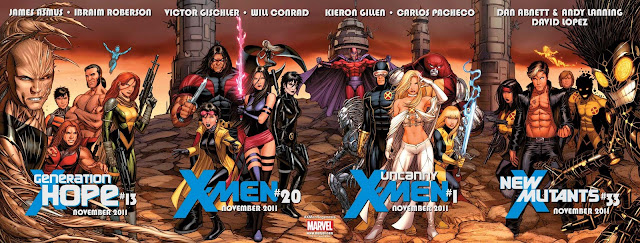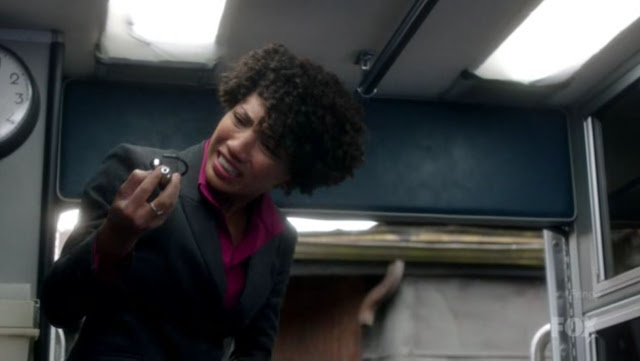Chad's article, "Savage Nerdery: Week Four of DC's new 52: Simulblog Reviews," can be read here.
Josh's article, "The New DCU: Sept. 28, 2011, A Simulblog" can be read here.
Arthur's article may or may not exist in the future.
The final set of thirteen new titles were released this week: All-Star Western #1, Aquaman #1, Batman: The Dark Knight #1, Blackhawks #1, The Flash #1, The Fury of Firestorm: The Nuclear Men #1, Green Lantern: New Guardians #1, I, Vampire #1, Justice League Dark #1, The Savage Hawkman #1, Superman #1, Teen Titans #1, and Voodoo #1. If you've been following along and dedicating yourself like I have, then you've just finished reading all fifty-two of the new first issues. What do you think? As you know, I don't do issue-by-issue run-downs, but I'd love to hear your opinion. Let's get some good discussion going today.
Like my first post, the only thing that this post is concerned with is the Justice League. And there was a lot of Justice League this week. Aquaman, The Flash, The Fury of Firestorm, and The Savage Hawkman are all considered Justice League titles by DC's web site. Justice League Dark is not included on this list, but it features a recent variation of the Justice League (Batman, Zatanna, Wonder Woman, Superman and Cyborg) while also replacing the Justice League in a way with magical individuals. Batman: The Dark Knight, Green Lantern: New Guardians, and Superman feature individuals who have, at least at one point in time, been quintessential members of the Justice League. Teen Titans is like a baby Justice League. And finally All-Star Western gives the background of Gotham City, potentially impacting the back story of Justice Leaguer Batman.
I do not believe that we get a lot of important information this week regarding the battled between Superman and Batman this week. But I think this week was the best at filling in the gaps for the people on the cover of Justice League #1. Furthermore, I think that two of the greatest successes from the reboot came out this week: The Flash #1 and Aquaman #1. The reason that I think these books are successes is that I knew almost nothing about either Barry Allen or Arthur Curry, but after reading the first issues they have become two of the most interesting characters for me. Considering the fact that the goal is to bring in new readers, I think the reboot is at the very least a partial success. Barry Allen is the kind of superhero that I'm not familiar with. Batman is smart. Superman makes you believe. Green Lantern is strong of will. But Barry Allen is a sweetheart. One of two moments of strong emotion for me this week was when Flash was asked, "These things - It's as if they're personal to you?" And Barry responds, "They all are." (The other was the horrible feeling when Clark Kent went to Lois's door and met her boyfriend in Superman #1.) We can tell that he feels the troubles of the people he deals with. And it also seems clear that he's looking for love, which will probably be a really big point for this book. While the plot of the first issue did not intrigue me, I am incredibly intrigued by the character and where he is going.
Aquaman may be one of my favorite books of the entire reboot. Much like Justice League #1, the book is kind of subtle. There are no enormous earth-shattering battles. There is just Arthur Curry, the Aquaman, a half-Atlantean who wants to get to know his human half. The issue begins with Aquaman fighting crime not in the ocean, but in the middle of town. He then attempts to dine with the people only to be interviewed and made fun of. The book is incredibly comedic. When Aquaman orders fish everyone thinks that it is tantamount to cannibalism because they believe he talks to the fishes (and not in the "I got on the wrong side of the mob" kind of way), and when he's interviewed he's asked, "How's it feel to be nobody's favorite hero?" Aquaman #1 gives us an underdog story with a little bit of Little Mermaid added for zest, and it almost steps beyond the fourth wall insofar as it addresses our questions and mockery regarding Aquaman. I'm happy to see that Aquaman is Geoff Johns' new baby. I'm expecting that Aquaman is going to be the best DC comic within the year. I know it's bold. But so is my prediction that the Lions are going sixteen and oh this season. Boldness does not denote impossibility. It makes possibility.
Before giving you my scorecard for the entirety of the DC reboot, I want to tell you which comics from this week I am going to continue reading. All Star Western, Aquaman, The Flash, Green Lantern: New Guardians, Superman and Teen Titans easily made the cut. And who here loves how they're handling Kyle Rayner in New Guardians. I do. I do. There were a few shaky titles this week that I am at least going to read the second issue of, but likely no further. Batman: The Dark Knight was by far my least favorite Batman title, destroying Harvey Dent's brilliant Two-Face by transforming him into a titan serum Arkham Asylum video game wannabe. Ick. But I'm giving it one more issue because I'm biased toward Bat-books. Justice League Dark had an interesting villain and I loved seeing the current incarnation of the Justice League getting torn apart, sometimes literally. But I have little concern for the characters who are going to be the leads in this book. Well, except Zatanna. She's pretty awesome. The Savage Hawkman starts with an interesting idea and then turns it into a stupid mix of X-Files and Spider-man symbiotes. And while Voodoo has a lot of sexual exploitation, I felt like it told a decent story. I'm completely done with Blackhawks, The Fury of Firestorm: The Nuclear Men, and I, Vampire, though. It was hard for me to complete those first issues, let alone go out and get the second issues next month.
THE SCORECARD
All books are ranked from best to worst within their division of the reboot.
SUPERMAN
1. Action Comics #1*
2. Supergirl #1
3. Superman #1
4. Superboy #1
BATMAN
1. Batman and Robin #1*
2. Nighwing #1
3. Batman #1
4. Catwoman #1
5. Birds of Prey #1
6. Batwing #1
7. Batwoman #1
8. Red Hood and the Outlaws #1
9. Batgirl #1
10. Detective Comics #1
11. Batman: The Dark Knight #1
GREEN LANTERN
1. Green Lantern #1*
2. Green Lantern: New Guardians #1*
3. Red Lanterns #1
4. Green Lantern Corps #1
JUSTICE LEAGUE
1. Aquaman #1*
2. Justice League #1*
3. Wonder Woman #1*
4. The Flash #1
5. DC Universe Presents #1
6. The Savage Hawkman #1
7. Justice League International #1
8.
9.
10.
11.
THE DARK
1. Animal Man #1*
2. Swamp Thing #1
3. Demon Knights #1
4. Resurrection Man #1
5. Frankenstein, Agent of S.H.A.D.E. #1
6. Justice League Dark #1
7.
THE EDGE
1. All Star Western #1
2. Voodoo #1
3. Stormwatch #1
4.
5.
6.
7.
8.
9.
YOUNG JUSTICE
1. Teen Titans #1
2.
3.
4.
5.
6.
Well, that's it for The New DCU Simulblog. You know what's up. Make sure you leave some comments here and check out Josh's post, Chad's post, and Arthur's posts if/when it goes up. I think I'm going to feel a little bit more lonely with this simulblog out of the way. The question now is: What's next?
Anybody up for a simulblog on X-Men Regenesis?








































